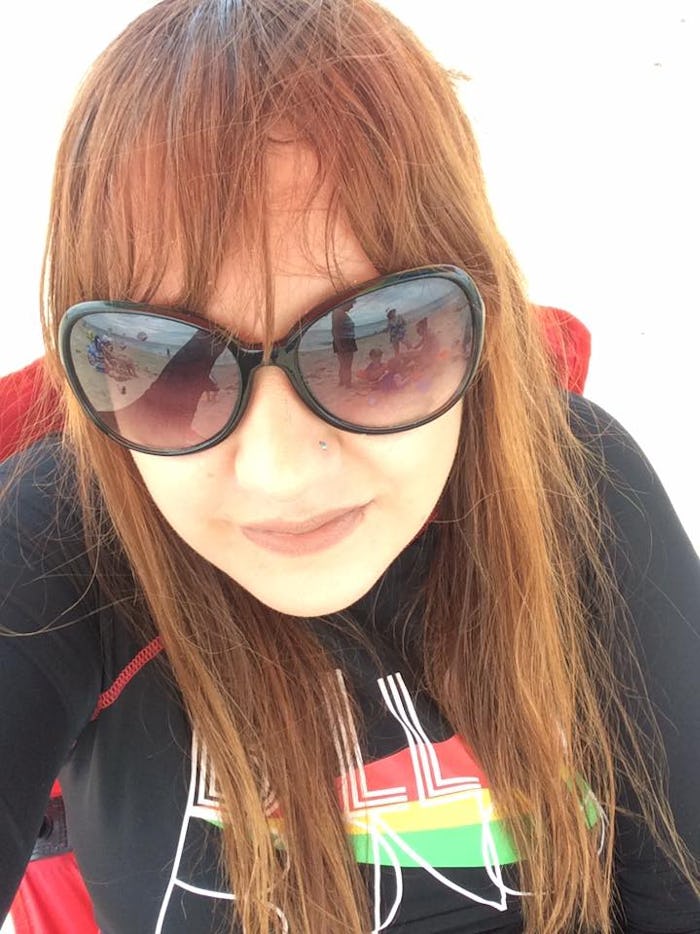Life

I Had My First Panic Attack When I Was Pregnant
My husband and I wanted a baby. We knew we wanted a baby, and we intentionally conceived the baby. I got pregnant on the first “Hey, let’s give this a shot” attempt. I found out right at two weeks post-conception, at the earliest possible window a test will pop positive, that I was pregnant. At first, I was jubilant. We both were. Then, something happened. My hormones began to shift. My body changed. And suddenly, this pregnancy didn’t seem like a good idea anymore. In fact, it seemed like a horrible, horrible idea. I became depressed and anxious. And while pregnant, I suffered my first panic attack.
I’ve struggled with depression my whole life. From the ages of 7 to 18, I suffered from major depression and generalized anxiety disorder — both untreated, which increased them in severity and longevity. I got medication for the first time when I was a freshman in college, which helped to some degree, but I didn’t take it for long. My anxiety returned. At the time I got pregnant, I wasn’t depressed, but I was suffering from profound anxiety (which I thought was normal). I was in the process of quitting graduate school to stay home with the baby I was carrying. I didn’t know it at the time, but my prior anxiety and the major life events were risk factors for antenatal depression.
At about seven weeks into my first pregnancy, I started bleeding. We ended up in the ER, where they did a sonogram to make sure the baby was OK. And we saw Blaise for the first time, a tiny little blip on the screen. I sobbed and sobbed. Here was the baby I was so afraid of. He was real. He was right there, on the screen, in my belly. And I thought he was a terrible idea. I cried out of guilt. I cried out of fear. I didn’t cry out of relief, which is what everyone thought was happening. Either that, or everyone pretended not to notice I was a blubbering mess and had been since they’d called us back from the waiting room. It’s an odd thing, people working on you and around you and ignoring the fact that you’re crying yourself sick.
Suddenly, my throat started closing. I couldn’t breathe. At first, my breath just hitched, and then I began gasping for air. My heartbeat sounded in my ears. I knew I was having a panic attack, but I thought it was my fault for being so upset. I thought I was depriving my baby of oxygen. I cried even harder. My gasps became shallower and shallower. I clutched my stomach.
I wasn’t just afraid of the baby, though — I was afraid of everything around the baby: terrified a certain family member would take him from me; terrified he was would be a girl (because I didn’t think I could raise a girl at the time); terrified I’d have gestational diabetes; terrified I’d have to deliver at a hospital and the nurses would take the baby, give him formula, and circumcise him. Only my husband knew how frightened I was. When I began to cry, he’d put me in the car and drive me to a fast-food place, where he’d buy me a sweet tea and then cruise around until I calmed down.
I still remember where it happened, on the overpass above one of the interstates. I was sobbing about something (I don’t recall what), holding a white styrofoam tea in my right hand and watching the headlights pass in the dark. And suddenly, my throat started closing. I couldn’t breathe. At first, my breath just hitched, and then I began gasping for air. My heartbeat sounded in my ears. I knew I was having a panic attack, but I thought it was my fault for being so upset. I thought I was depriving my baby of oxygen. I cried even harder. My gasps became shallower and shallower. I clutched my stomach.
“Drink some tea, drink some tea,” my husband urged. “Breathe slowly. You can do it. You’re OK. Breathe. Just breathe.”
I concentrated on the tea. I sipped at it, flailing for breath in between drinks. And slowly, slowly, my breathing came back to normal. I still cried. But my chest wasn’t tight, and I couldn’t hear my heartbeat anymore. I felt horrible. This was my fault. I worried I’d hurt my baby.
The panic attacks continued, on and off, until a nurse-midwife prescribed an anti-anxiety medication for me and set me up with an appointment for a psychiatrist. At the appointment with my psychiatrist, she gave me a medication that was more than a stopgap; it was an antidepressant that worked. Only once I got on Zoloft did the panic attacks recede. I could be happy about my pregnancy. I no longer worried, as I'd told a friend, that I couldn't take of my baby because I could barely take care of myself. I could take care of myself again. The medication made that possible.
And when Blaise was finally born, he was the sunniest, happiest baby we’d ever seen. He never cried, except for his silent reflux pain. And because I stayed on my antidepressant, I suffered from neither postpartum depression nor postpartum anxiety. My mother-in-law said my husband and I were acting like this was our fourth baby, not our first. I was making it. I was doing well. And while I had a few panic attacks some years later, I wasn’t pregnant, and they weren’t related to my children. I’m grateful that, for the most part, they ended. But mostly, I’m glad my baby came through them OK.